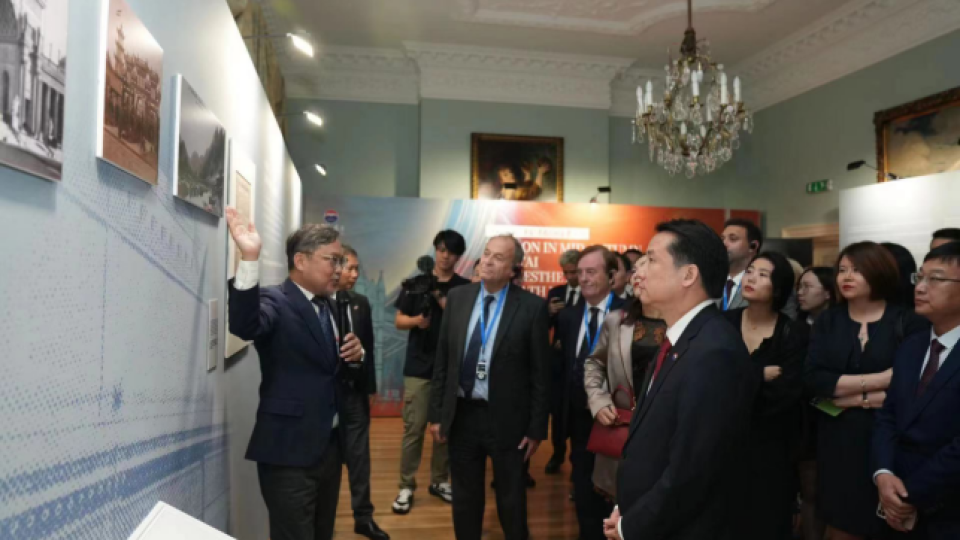October 2, 2023
LONDON – China’s leading liquor maker, Kweichow Moutai, held a brand culture exhibition on Wednesday in London, England, with documents, old pictures, product samples, and more on display telling the story of the company’s development.
Kweichow Moutai specializes in the production and sale of a spirit called Moutai that is made exclusively in a town called Maotai, in Southwest China’s Guizhou province.
The liquor, which is distilled from sorghum and wheat, needs years of preparation before it is ready to drink and is one of the most popular drinks in China and a beverage that is usually served on State occasions.
Offering a series of branded products, Kweichow Moutai was founded in 1952 around three small workshops and has grown to become one of the most valuable Chinese brands. Indeed, according to the Hurun Most Valuable Chinese Brand 2022 ranking released in April this year, the alcohol company topped the list for the fifth consecutive year, with a brand value of 1.04 trillion yuan ($150 billion), outperforming technology giants Tencent and ByteDance, the developer of Tik Tok.
The company’s exhibition in London was part of its efforts to expand globally. Prior to the UK event, the company held similar events in the capitals of Japan and France earlier this month.
“The displays here encompass the journey of Kweichow Moutai, as Moutai is not just a bottle of spirits but also represents a culture,” Ding Xiongjun, president of Kweichow Moutai Co Ltd, said at the exhibition’s opening ceremony.
According to Ding, throughout the company’s more-than 70-year journey, Kweichow Moutai has been committed to producing high-quality liquor, contributing to the economic development of China, and carrying on corporate social responsibility, all of which, he said, demonstrate the company pursues the beauty of life.
“Let us look forward to mei (beauty) with Moutai,” said Ding.
Stephen Perry, chairman of the 48 Group Club, a London-based non-profit organization dedicated to promoting Sino-British trade cooperation, said he was pleased to learn about the culture of Moutai and its significance for the company, society, and nation.
“In the long run, the modernization of China will only succeed if the culture and society are right,” he said. “As my years have gone on, I have been more and more aware of the importance of Chinese culture. And I am quite sure that China will play a critical part in helping us to achieve a more civilized world.”
Marie Cheong-Thong, a member of the spirits judging committee at the International Wine and Spirit Competition, whose awards are considered high honors in the industry, told China Daily that Moutai is an “amazing” spirit that the West needs to appreciate.
“Once the Western world tastes and gets over this crazy, amazing, funky spirit, they can understand how amazing Moutai is, and why and how the Chinese can make this happen over thousands of years,” she said. “People here do not know how amazing something from the Far East can be and how different it is. But today, to see Moutai bottles arranged along my way was just fascinating.”
A high-level dialogue
On Friday, senior representatives from the China Alcoholic Drinks Association (CADA), Kweichow Moutai, Diageo, a British multinational alcoholic beverage company, and Pernod Ricard, a French wine and spirits group, attended a meeting hosted by CADA in London to discuss the sustainable development of global spirit industry.
Three major spirit players jointly released a cooperation consensus and agreed to build a platform coordinated by CADA where dialogues and collaborations on anti-monopoly, spirits culture exchanges, sensible drinking promotion, ecological sustainable development and more, will be enhanced.
“This meeting is a high-level, forward-looking and historical gathering of three leading liquor brands to date,” said Song Shuyu, chairman of CADA.
Global liquor makers share common challenges of transformation and innovation as more and more people are pursuing to live a high-quality life where a sensible and classy drinking habit is emphasized, said Ding, who also stressed the urgent need to address climate change issues.
“I wish that the communication today can be expanded into a more stable mechanism where each company can take turns to host regular meetings,” he said.
Javier Ferran, chairman of Diageo, said rapid changes can cause short-term obstacles, but can also bring long-term opportunities. He expressed hope that solutions can be jointly developed for the recycling of materials in the industrial chain.
Gilles Bogaert, executive vice-president of global markets at Pernod Ricard, said efforts can be made to build more balanced and effective drinking regulations in different countries to support healthy alcohol drinking.


